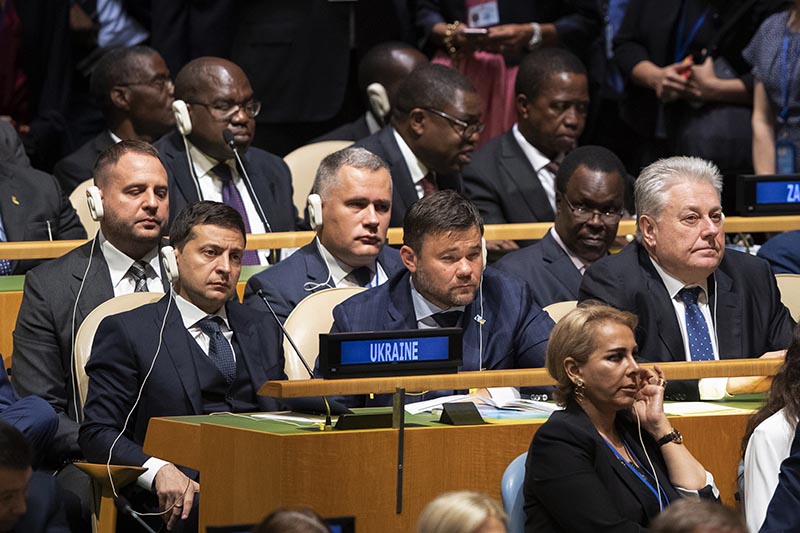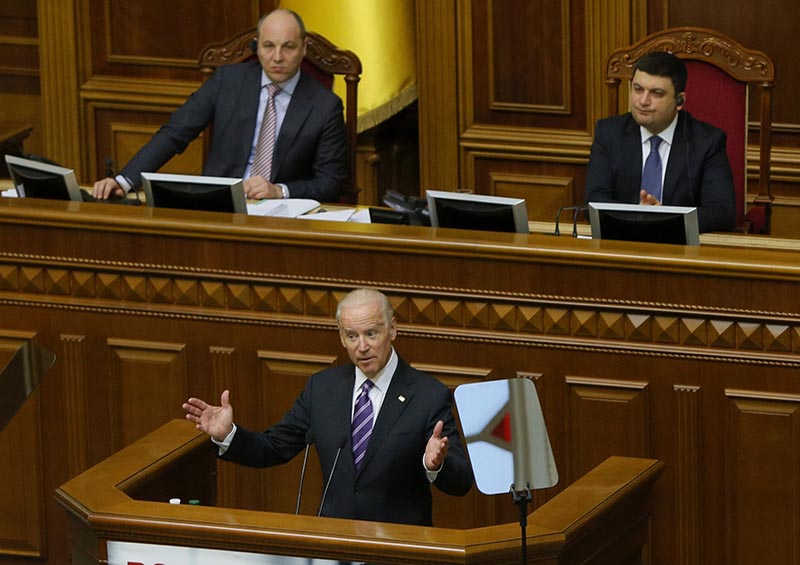Ukraine entangled yet again in American political storm
WASHINGTON: President Donald Trump's withholding of military aid from Ukraine and his calls for the country's new president to investigate the family of a political rival have thrust the East European nation into an American political storm for the second time in three years.
Before news broke that an intelligence whistleblower had filed a formal complaint based in part on a conversation between Trump and his Ukrainian counterpart, Ukraine had gained notoriety during the trial of former Trump campaign chairman Paul Manafort. He was convicted last year on charges related to his political consulting work in the country.

Now, Trump has acknowledged pressing Ukrainian President Volodymyr Zelenskiy to investigate Democratic presidential contender Joe Biden and his son, Hunter, who served on the board of directors of an energy company in Ukraine. This prompted a showdown with Congress, as Democrats said they would proceed with a formal impeachment inquiry into Trump.
Ukraine has been a focus of US interest, and recipient of millions of dollars in American aid, since a pro-Western government took power in 2014 and Russia annexed Ukraine's Crimean Peninsula and threw its weight behind separatists fighting in eastern Ukraine.
The country has energy resources that have made it a magnet for people looking for business opportunities such as Hunter Biden. It has a messy political scene that has turned it into a lucrative destination for political consultants and lobbyists such as Manafort.
"It's a place where you need political connections to secure your assets," said Keith Darden, an associate professor at American University's School of International Service who specializes in Ukraine. "You get people who are skilled in operating in that environment, someone like Paul Manafort, or someone who can take advantage of that environment like Hunter Biden, and they can make money."
Ukraine's role in multiple story lines reflects the outsized role billionaire oligarchs play in shaping core sectors of the economy and their ability to offer high-dollar payouts, often with the goal of shaping public opinion and improving the international standing of a country caught in a geopolitical sweet spot between Russia and Western Europe.
Ukraine featured in America's 2016 presidential election because of revelations that Manafort earned millions from his consulting work there and hid the proceeds to avoid paying taxes.
The country was at the center of the recently concluded trial of Greg Craig, a White House counsel to President Barack Obama who was acquitted of lying about Ukraine business dealings.
A nation of 45 million, Ukraine has long been considered one of Eastern Europe's most corrupt countries, with powerful businessmen buying political influence and often their way into parliament to gain immunity from prosecution.
Zelenskiy, an actor who had no political experience, won the presidential election by a landslide in April, reflecting Ukrainians' frustration with rampant corruption. He has pushed fraud-fighting measures that include scrapping criminal immunity for lawmakers.
"They have a very big hole to dig themselves out of," said Nina Jankowicz, an expert on Eastern Europe at the Wilson Center in Washington. "It's basically been 30 years of unchecked corruption."
At the same time, Ukraine is heavily reliant on foreign assistance and seeks to cultivate favorable public opinion in the West to keep the aid flowing, Darden said.
Trump has sought to implicate the Bidens in the kind of corruption that has long plagued Ukraine. He raised the issue in a July 25 phone call with Zelenskiy that is at the center of the whistleblower complaint now roiling Washington.
Hunter Biden was hired by the Ukrainian gas company Burisma Holdings in April 2014, less than two months after Ukraine's Russia-friendly president, Viktor Yanukovych, was ousted by protesters and as Biden's father, as vice president, was heavily involved in US. efforts to support the new pro-Western government and its pledge to fight corruption.
The hiring of the US. vice president's son immediately raised concerns that the Ukrainian firm, whose owner was a political ally of the ousted president, was seeking to gain influence with the Obama administration. There's been no evidence of wrongdoing by either Biden.
Ukraine's leaders have for years pivoted to Russia or the United States, depending on the political affiliation of each new president, and have often tried to use close ties with one country against the other.
In one of the best-known cases, Yanukovych and his Party of the Regions paid millions of dollars to Manafort. His goal was to promote Yanukovych as a liberal, pro-Western politician and whitewash his attack on political rival Yulia Tymoshenko, who was imprisoned in 2011 following a trial widely seen as Yanukovych's personal vendetta.
Manafort was Trump's campaign chief when revelations surfaced about his work for Yanukovych's party and clandestine payments. He resigned and was convicted, during special counsel Robert Mueller's investigation, of concealing millions of dollars in proceeds from the work.
That probe had multiple offshoot investigations. One was into Greg Craig, who was commissioned with his law firm — for $4 million — to produce a report on the Tymoshenko prosecution. The government hoped the report would counter international criticism of the prosecution, thereby boosting Kyiv's international standing.
Prosecutors argued Craig helped develop a media rollout strategy for the report and lied about it to the Justice Department. But Craig said he saw his function as simply heading off erroneous spin from Ukraine about his report's findings and maintained that he never did the Ukrainian government's bidding or misled the Justice Department. He was acquitted after just hours of deliberation.
It wasn't the first time Ukrainian interests sought to shape American opinion.
Ukrainian steel mogul Victor Pinchuk, who is married to the daughter of former Ukrainian President Leonid Kuchma, paid political consultant Doug Schoen $40,000 a month to share his views with American policymakers on democratization in Ukraine, according to records filed under the Foreign Agents Registration Act.
A December 2016 Wall Street Journal op-ed by Pinchuk said Ukraine needed to make "painful compromises" to secure peace with Russia. Among the concessions he suggested were setting aside Ukraine's claim to Crimea and putting its goal of joining the European Union on hold.
Pinchuk said in the op-ed he had hosted Trump as a speaker by video link at the 2015 Yalta European Strategy annual meeting in Kyiv and Trump had expressed "great respect" for Ukraine. Pinchuk didn't mention a $150,000 payment he made to the Donald J. Trump Foundation in exchange for the talk, which occurred a few months after Trump announced his candidacy for president.






